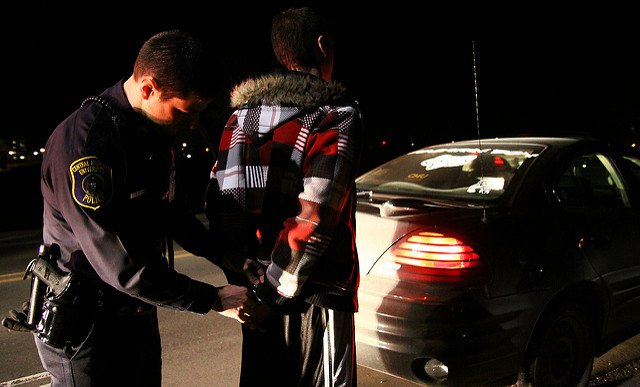Looming Legal Weed Sparks Roadside Worries in Canada

Canada’s oh-so-green federal government sure isn’t concerned about one form of air pollution — clouds of marijuana smoke. With the country’s cities already infused with the tell-tale odor of wacky tobaccy, legislation has been tabled to make possession of the drug legal, perhaps by as early as July 2018.
Great news for grass aficionados, but a troubling turn of events for road safety advocates. The jury’s out on whether Canada’s law would spark an uptick in drugged driving, but the proposed methods of testing — and convicting — weedy drivers has raised other concerns. One group has a problem with the Great Green North’s strategy to root out baked motorists.
It would seem the Canadian government is entering the wild and woolly world of weed with a reasonable degree of caution.
On the same day as the legalization legislation, the government tabled another bill targeting impaired drivers. The new measures will “better deter and detect drug-impaired driving,” the government claims, and would see motorists hand over two types of bodily fluids for testing during a roadside stop. Like booze, the bill would set legal limits to the amount of THC in a driver’s bloodstream.
While police officers will still be able to use their judgement to detect impairment — and provide opinion evidence in court — the motorist’s blood and saliva will likely seal their legal fate. In some U.S. jurisdictions, plenty of doubt has attached itself to the results of saliva swab tests. A blood test is meant to overcome the inaccuracies present in the first test.
According to the Canadian proposal, “Qualified technicians would be able to take blood samples from a driver without a doctor’s oversight, allowing for testing sooner after a person is pulled over.” This is supposed to increase the accuracy of the test and free up scarce healthcare personnel. However, the Canadian Automobile Association (CAA) has voiced its worry over the testing.
The new law “would require a positive blood test within two hours in order to get a conviction,” the association stated in a recent release. “Evidence from U.S. jurisdictions is that it often takes longer than two hours to complete the process, and also requires the presence of a trained technician to take the sample, putting a tough burden on law enforcement and raising questions about how workable the provision will be.”
After several states legalized marijuana, a study showed levels of bloodstream THC didn’t correspond with a driver’s level of impairment. Because of this, the American Automotive Association has advocated for observation-based impairment detection, where trained officers analyze a number of physiological and behavioral indicators.
It sounds like Canuck cops might be given that say, though it’s doubtful that a driver with blood-tested THC levels above the legal maximum would get a pass, regardless of how sharp they were while standing on the roadside. Another concern is the training promised for police forces.
“While the government committed today to making more money available to train police in drug recognition and to acquire testing devices, it didn’t say how much or when it will be available,” CAA stated. It has the same concern about the limited money promised for public information campaigns.
Don’t expect the so-called “Prince of Pot” Marc Emery to make the job of the government (or CAA) any easier. The marijuana activist and high-profile supporter of Canadian Prime Minister Justin Trudeau — who ran on the promise to legalize — just told the media that smoking weed makes you a better driver.
[Image: Jeffrey Smith/ Flickr ( CC BY-ND 2.0)]

More by Steph Willems
Latest Car Reviews
Read moreLatest Product Reviews
Read moreRecent Comments
- Paul I don't know how GM can fail to sell sedans. Other manufacturers seem to be able to, as others have noted. The Impala (which I've had as a rental) was a very nice sedan and the Malibu (which I had as a rental more recently) was a pleasant, competent vehicle also. Maybe they are still suffering from the bad rep they got in the malaise era into the 80s.
- Kwik_Shift_Pro4X How a Versa that's a $18000 car became a $24000 car says a lot. Or even the jacked price of the current Frontiers. Not worth it.
- MaintenanceCosts They should focus on major non-Interstate routes in the flat West. I recently did a central Texas trip with a Model S rental. It was just fine along the interstates but there were significant gaps on the big federal highways, which caused a bit of extra driving to reach charging stations. The one public (non-"customers only") charger in the greater Fredericksburg area was very busy, even at non-peak times.
- Tassos Real Cars are RWD.So if you want a Lexus, try either the GS, or the flagship LS460 (before they mutilated it into the current failed model)The ES used to be a rebadged Camry, then became a rebadged Avalon at $10k more. Not a wise buy, unless you are a silly snob and would not be caught dead driving an econobox.
- Ajla Sounds like the pinstripes, nitrogen, window tint, TruCoat, and "filing fee" is about to go up. It is pretty fun to see a $18K Versa with $3k in add ons.


































Comments
Join the conversation
Pull over a young male in a Grand Am, there's a pretty good chance you'll find something.
My experience, many years ago, was that many 'stoners' typically drove pretty poorly whether or not they were high at the time. People who were really baked, would drive excessively carefully and slowly, to the point of being a danger to others as well as being very obviously impaired. People who functioned at a moderate level of high-ness, the average person would not be able to tell a difference.